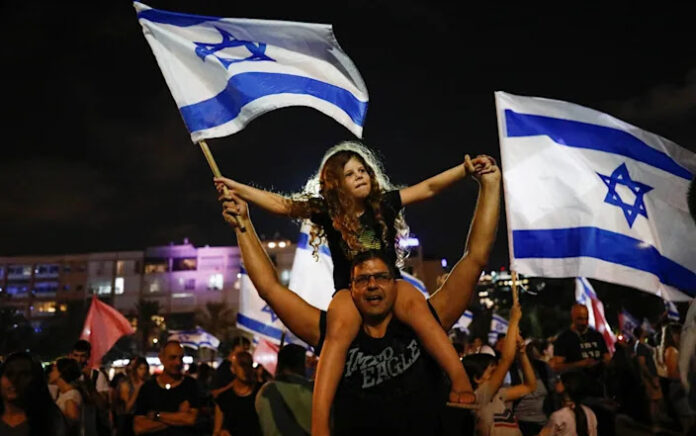
The 49-year-old is at the helm of a fragile coalition government which is united only by its determination to oust Benjamin Netanyahu, Israel’s longest serving prime minister.
With Mr Netanyahu banished to the opposition benches, the so-called “change” government must now turn its attention to security issues, economic recovery in the wake of the Covid pandemic, threats from Iran and a new relationship with Washington.
But with a razor-thin majority of just 60-59 seats in the Knesset, the Israeli parliament, even the coalition’s own leaders have admitted that passing any meaningful legislation will be an uphill battle.
On key foreign policy areas, such as Iran, the Bennett government has signalled that there will be few departures from the Netanyahu era.
Mr Bennett has already expressed his firm opposition to reviving the Iran nuclear deal, a move that Israel fears will strip Western allies of leverage over the regime.
As Iran is universally regarded in Israel as an existential threat, there is no prospect of a rapprochement between the two countries.
Israeli strikes on Iran’s nuclear assets, such as the Natanz centrifuge facility, are likely to continue, as will attacks on Iran’s proxies in Syria.

Mr Biden called Mr Bennett to congratulate him on his victory within just a few hours of Sunday’s historic Knesset vote, and was embraced by the new prime minister as a “great friend of the state of Israel.”
Mr Bennett’s alliance with left-wing and centrist parties, as well as the Arab party Ra’am, will also stifle his hopes of any major new policies on the Israeli-Palestinian conflict.
A former settler leader, Mr Bennett draws much of his support in the Yamina party and has made sustained calls to annex swathes of the West Bank and expand settlements in both the West Bank and East Jerusalem.
But this is anathema to Ra’am, a party representing Palestinians citizens of Israel, while centrist partners such as Yair Lapid are more circumspect than Mr Bennett about taking any steps that would inflame tensions with Palestinian leaders.
- Big cats seized from park belonging to Tiger King couple
- Palestinians see victory in Gaza truce as Israel warns Hamas
This could be what prompted Mr Bennett to vow in a speech on Sunday that he would merely “shrink” the Israeli-Palestinian conflict, rather than attempt to resolve it.
Mr Bennett is also poised to face a major security headache on his third day in power, in the form of a controversial nationalist march due to be held on Tuesday.
The march had been due to take place on “Jerusalem Day,” a holiday of nationalist parades in Israel, on May 10 – but it was postponed as the conflict between Gaza and Hamas erupted.
It was eventually rescheduled by the Netanyahu government for Tuesday – in a move that left the issue in the hands of Mr Bennett.
If Mr Bennett allows the march to take place, Israeli security officials fear it could unleash yet another wave of violence in the form of riots and mass protests, which could also spread to the West Bank.
Hamas in Gaza is watching preparations for the march closely and has warned it may launch attacks on Israel if it goes ahead.

As the coalition is already facing bitter divisions on totemic issues, it is likely to focus its energy on less controversial domestic policies.
At the top of the agenda is reinvigorating Israel’s economy in the wake of the coronavirus pandemic, which at one point saw unemployment rise to an unprecedented 20 per cent.
Mr Bennett is also eager to heal Israel’s fractured political sphere, which over the past four years was dominated by one issue only: whether it was for or against Mr Netanyahu.
The coalition represents “all of Israel,” Mr Bennett has said, signalling a departure from the divide-and-rule tactics which defined Mr Netanyahu’s rule.
And there could be another departure from the Netanyahu era on the cards – the Israeli government’s relationship with ultra-orthodox Jewish communities.
Throughout his 12 years in power, Mr Netanyahu leaned heavily on support from ultra-orthodox parties to keep him in power.
In return, the devout minority was in effect allowed to government itself, deepening the rift in Israeli society between secular and religious citizens.

Critics of this hands-off approach say it was partly to blame for the Mount Meron disaster earlier this year, where 45 people were killed in a stampede at an ultra-orthodox festival.
The event was allowed to go ahead despite breaching the government’s Covid and crowd-control regulations, as well as repeated warnings that its cramped venue was a major safety hazard.
But Mr Bennett, who is not constrained by demands from ultra-orthodox parties who are now outside government, has already pledged a formal state inquiry into the tragedy.
The investigation could potentially lead to curbs on autonomy for ultra-orthdox Jewish communities, which Israel’s secular leaders hope will prevent catastrophes such as the Mt Meron stampede from reoccurring.
SOURCE: YAHOO NEWS




